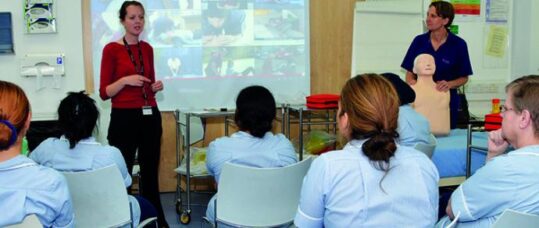Skills simulation ‘should not substitute practice hours’, say nurses

The Nursing and Midwifery Council’s (NMC) proposals to increase the proportion of practice learning and procedural skills assessment provided through simulation have been met with opposition by respondents to its draft standards of education.
In a consultation update published at their latest council meeting, the NMC states that ‘a very large majority of respondents’ think there should be a cap on the maximum number of practice hours that can be completed in simulation.
There was also a ‘widely held conviction’ by respondents to the consultation that ‘simulation should not be seen as a substitute for hours spent in practice settings’ when it comes to achieving competence of procedural skills.
Related Article: Supporting the development of advanced nursing skills in community nursing
Opinions were ‘polarised’ as to whether student nurses should be required to demonstrate proficiency across each of the four fields of nursing practice in order to demonstrate that they have met the communication and relationship skills to practise safely and effectively.
‘Open ended comments suggest a divide between those that believe all fields should be able to demonstrate proficiency in core skills, which are transferable – as opposed to those that believe more advanced proficiencies are needed for some skills according to the field’, the papers said.
On the proposal for those supporting, supervising and assessing students no longer being required to have completed an NMC-approved training programme, the consultation update stated that ‘most respondents’ disagreed.
However, there were ‘mixed opinions’ regarding the suggestion that practice supervisors can be any registered health and social care professional who is suitably prepared, and not an NMC registrant.
A second consultation, which received 700 responses, sought views on changes to prescribing, including whether the NMC should remove its standards for medicines management.
Related Article: Q&A: What do field specific standards for community nursing mean for me?
Only 27% of all respondents agreed with the proposal to withdraw the standards, with 40% disagreeing and 33% undecided.
The papers once again cite ‘mixed opinions’ in response to the proposal that nurses would be able to complete a community practitioner prescribing programme (V150) immediately after joining the register.
Almost half of the organisations that responded agree with this proposal, however only 28% of the individual respondents supported the idea (with 65% of individuals disagreeing).
The main theme emerging from respondents’ comments, the NMC said, was that there needs to be ‘a period of consolidation/preceptorship’ for nurses and midwives before they can complete their V150.
Related Article: £30million set aside to fund nurses in research positions
The consultation period was held between June and September 2017, and was seeking feedback from the nursing community on a number of proposals. In June, Nursing in Practice reported on the opening of the consultation, including proposals that:
- Student nurses should be taught the same core skills regardless of field of practice.
- Simulation activities should be used to replace a portion of time spent on clinical placements.
- Course assessors and supervisors will no longer be required to have completed an NMC-approved training programme.
It remains to be seen whether the nursing commiunity’s split responses to the NMC’s proposals will alter the regulator’s plans.

See how our symptom tool can help you make better sense of patient presentations
Click here to search a symptom


The Nursing and Midwifery Council’s (NMC) proposals to increase the proportion of practice learning and procedural skills assessment provided through simulation have been met with opposition by respondents to its draft standards of education.



